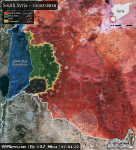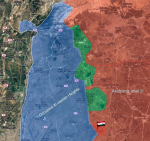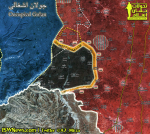What I'm most interested in now is the dynamics between the Syrians, YPG/SDF and the Turks in the North. Things can spiral out of control there.
Alliances shift as Syrian Kurdish alliance holds talks with Assad regime
© Sana/AFP | Syrian President Bashar al-Assad during a press interview on June 10, 2018.
Text by
FRANCE 24
Latest update : 2018-07-27
A US-backed Kurdish alliance is holding talks in Damascus with Syrian government representatives with an eye on Turkish ambitions in Syria.
The ancient adage, "The enemy of my enemy is my friend,” is once again being put into action on the ground in Syria, where a seven-year civil war has seen regional and global powers forced into sometimes unlikely agreements and accommodations.
This week, representatives of the US-backed, Kurdish-led SDF (Syrian Democratic Forces)
traveled from northern and northeastern Syria to the capital, Damascus, for the first time, for talks with officials from Syrian President
Bashar al-Assad’s government.
The SDF, an alliance of predominantly Kurdish fighters, as well as Arab militias, was formed in 2015 to defend Syria’s northeastern region from jihadist groups such as the
Islamic State (IS) group and al Qaeda-affiliated militias.
Following hard-fought military campaigns in and around northern Syrian towns such as Kobane and Manbij, Syria’s Kurds were determined not to lose their gains to hardline Salafist groups such as the IS group. Their goals coincided with those of the US, France, Britain and other nations affected by the IS group threat.
But changing times require changing alliances – especially for the Kurds, the world’s largest ethnic group without a homeland. Spread across the border regions of Turkey, Iraq, Syria and Iran, the Kurds have historically been played by global powers, wooed when their fighting skills are needed only to be abandoned at payback time.
While SDF fighters captured the IS group’s de facto capital of Raqqa in October 2017 with support from the US-led coalition, Washington has since been inconsistent about its support for Syria’s Kurds.
Meanwhile a military intervention in Syria by Turkey -- which views the Kurdish gains across its southern border with deep unease -- led to the capture by Turkish forces of the Kurdish enclave of
Afrin in northwestern Syria. Turkey, a NATO ally, has threatened to wrest Manbij -- a town around 25 kilometres east of Afrin -- from SDF control, and there has been periodic fighting between a militia linked to the SDF and Turkish-backed Syrian rebels.
The Turkish advances, along with conflicting US statements over its military plans in Syria, has left the Kurds within the SDF – which controls about 27 percent of Syrian territory -- extremely wary about their future in the autonomous areas.
"The Kurds today have an autonomous administration that they will probably not be able to maintain, but they can find some advantages to a compromise with the [Syrian] regime: the return of public services and state administrations that they never have had the means to finance," explained Thomas Pierret of CNRS (Centre National de la recherche scientifique) in an interview with
FRANCE 24.
Cooperation on the ground
In the lead-up to the latest talks, Kurdish-led forces have been reaching agreements on the ground with Syrian army units, according to local media reports.
Last year, Kurdish forces surrendered a few villages between Manbij and al-Bab further west to Syrian army units to enable the SDF to concentrate on the battle for Raqqa. "The Raqqa battle was disturbed many times because of the Turkish-backed attacks on our areas, so we handed those areas [to a Syrian army unit] to carry on the offensive against Daesh [IS group],” a Syrian Kurdish official told
Kurdistan 24.
The cooperation on the ground has been increasing in recent months. Earlier this month, an SDF official told the local Hawar news agency that there were talks between the local council of SDF-controlled Tabqa and local Syrian government officials to improve services and to restore the regime’s powers over the Tabqa dam, Syria’s largest dam.
Getting US troops out of Syria
At the start of the Syrian uprising in 2011, Assad attempted to woo Syria’s Kurds, a long marginalised group, against what he primarily viewed as a Sunni rebellion against his regime. With Turkey supporting the Syrian opposition, Assad initially
attempted to win Kurdish loyalty by issuing a presidential decree granting Syrian citizenship to tens of thousands of them – something the Kurds had been seeking for more than half a century.
But while Assad was content to ignore the fighting in the Kurdish areas, concentrating instead on more strategic battles such as Aleppo, the recent gains by the SDF have been viewed with suspicion in Damascus. Backed by Russia and Iran, the Syrian leader today has succeeded in regaining control of huge swathes of the country and Assad can now concentrate on ensuring that the autonomous zones do not break away from Syria.
Assad views both US special forces and Turkish troops in the area as “occupying forces” and is eager to see them out of Syria.
There are currently around 2,000 US troops stationed in the Manbij area, and according to Aron Lund from the New York-based Century Foundation, "The priority for the Syrian regime is to get rid of US troops on its soil,” he noted in an interview with FRANCE 24, adding that, “Negotiations could speed up their departure."
A Kurdish lawmaker who sits in the national parliament in Damascus told the AFP Friday that the talks would focus on confining SDF ambitions to the cultural sphere with central government control restored in areas under its control.
Syria’s Kurds, like their counterparts in Turkey, have maintained that they do not seek independence from either Damascus or Ankara, but are demanding autonomy to control local administrative services and protect their cultural identity, including teaching the Kurdish language in schools.
The Kurds have been consistently left out of UN-led diplomatic talks in line with the wishes of NATO member Turkey, which views Syria's dominant Kurdish groups as an extension of the militant
Kurdistan Workers' Party (PKK).
Security issues to be ironed out
But the return of Syrian state control would still be a tough pill for the SDF to swallow. The Kurdish areas these days are being run by primarily leftist local councils that have equal representation of women. Kurdish flags, along with photographs of
Abdullah Ocalan -- the Kurdish leader imprisoned on a Turkish island -- adorn public buildings and the sense of a Kurdish renaissance of sorts prevails across the autonomous zones.
There are also major security issues to be ironed out between the two sides, according to Pierret. "One of the important questions that will arise is the future of SDF combatants. Will these militiamen form a local police, in theory subordinate to Damascus, or will they go back to reintegrate the Syrian army? Many questions remain unresolved,” he noted.
Some initiatives have already been launched in recent months, including better cooperation in Qamishli, a border city once dubbed, “the secret capital of Syria’s Kurds”. Kurdish flags and posters of Ocalan have been removed from Qamishli streets in recent days and the Tabqa dam has been restarted by mutual agreement between the SDS and Damascus.
Any future compromise will depend on the flexibility of the Syrian regime as well as Assad’s international backers. "Russia would not be against a federal solution, while Iran is hostile to any form of autonomy for the Kurds," explained Pierret.
Turkey’s position will also be critical to any future solution. There are currently around 1,300 Turkish soldiers around Idlib and Turkey supports several thousand rebel militia fighters allied to various groups.
Any coordination between the SDF and the Assad regime on the ground would be a red line for
Turkish President Recep Tayyip Erdogan.
But that is precisely what Assad would like to see. The Kurds have never been a priority for the Assads since the family seized control of Syria in 1970. But if the current Syrian leader manages to woo the Kurds on his side against his arch foe, Erdogan, it would mark a suitable alliance with an enemy of his enemy.
Link:
Alliances shift as Syrian Kurdish alliance holds talks with Assad regime - France 24
Looks like SDF and Syarian government is going to forge an alliance in return for autonomy. Smart choice I would say, Kurds know that US is there for temporary political objectives and in long term, it is better to have close relation with Damascus government.










